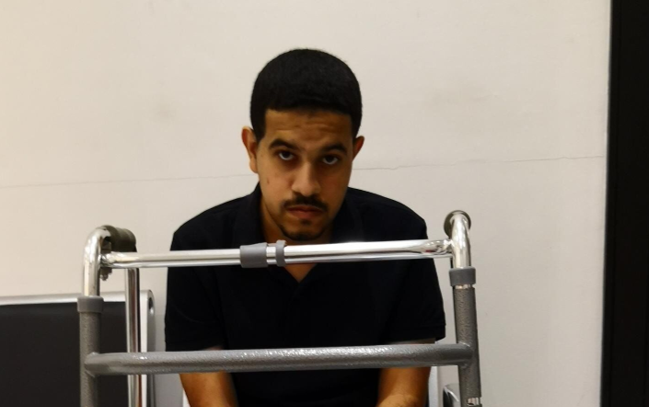Hani Mohamed AlNajjar is a 25-year-old administrative assistant and Bahraini citizen. Hani suffers from muscular dystrophy and requires a three-hour long physiotherapy session each week. His condition causes a chronic weakness in his upper and lower limbs, making it difficult for him to walk and perform certain life functions without assistance. Before his arrest and unfair trial, Hani lived at home with family, who helped to take care of him.
On 12 May 2019, a family member of Hani’s received a call from the Criminal Investigations Directorate (CID) asking them to come to the Investigations Building the following day. On 13 May 2019, Hani’s family member went to the Investigations Building, where he was required to sign a paper pledging to bring Hani to a hearing before the Fourth High Criminal Court, which has jurisdiction over terrorism cases.
On 14 May 2019, Hani attended the hearing and was charged with recruiting and financing terrorists, which he denied. The judge entered a decision to release Hani pending trial, due to his disability.
A few days later, Hani was arrested again while at the airport with a family member. He was about to travel to visit a religious site that is sacred to Shia Muslims. Officers held him from the morning until about one in the afternoon and asked about his travel plans. Officers then detained him once again, stating that he was a wanted fugitive.
Hani presented officers with his release order from the judge, was subsequently released, and officers modified his status to ban him from traveling abroad. Hani’s family members filed a complaint with the Ombudsman of the Ministry of the Interior concerning the travel ban but did not receive a response.
On 11 July 2019, Hani was convicted of illegal assembly, rioting, and providing funds to terrorist organizations. Specifically, he was accused of recruiting another defendant to assist him in financing terrorist activities. Hani was sentenced to three years’ imprisonment and a fine of 100,000 Bahraini dinars.
On 19 August 2019, plain clothed officers arrested Hani in front of his office and transported him in an unmarked car to Jau Prison to serve his sentence.
The prison is overcrowded which makes Hani’s already limited movement more difficult. Hani is allowed to use his crutches but is not allowed to walk the aisle of the cell block, which was recommended by the prison doctor. He has been taken to the prison clinic for his physiotherapy, but there is a shortage of appropriate medical equipment. His family members filed a complaint with the Ombudsman regarding the lack of adequate medical care.
Hani’s sentencing and imprisonment are in violation of Bahrain’s international human rights obligations. Specifically, he was denied adequate time for the preparation of his defense since his first hearing was held a day after his summons. This is in violation of Article 14 of the International Covenant on Civil and Political Rights (ICCPR) which provides the right to adequate time and facilities to prepare a defense and communicate with counsel. Additionally, Hani is not being provided appropriate treatment or accommodation for his muscular dystrophy while in prison, and so his detention is also in violation of Article 12 of the International Covenant on Economic, Social and Cultural Rights, which guarantees the right of everyone to the enjoyment of the highest attainable standard of physical and mental health.





